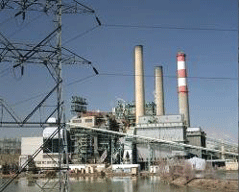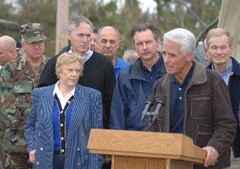U.S. Coal Losing its Glow?
Air Date: Week of August 3, 2007

A coal-fired power plant. (Courtesy the Office of Senator Patrick Leahy (D-VT))
U.S. "COAL RUSH" SLOWS DOWN: The push to build as many as 150 new coal-fired power plants could be running out of steam. Dozens of coal projects have been scrapped as investors fret over the cost of controlling greenhouse gas emissions. Living on Earth's Jeff Young reports from Washington.
Transcript
CURWOOD: From the Jennifer and Ted Stanley Studios in Somerville, Massachusetts – this is Living on Earth. I’m Steve Curwood. A voracious appetite for electricity has the U.S. racing to build new power plants, many of them fired by coal. Just a few months ago some 150 coal burners were on the drawing boards. But a funny thing happened on the way to the coal rush: people who would pay for those new power plants started saying “no.” Plans for more than a dozen coal power plants have been cancelled so far this year due to concerns about climate change, air quality and cost. As part of our series “Generating Controversy: The Changing Climate of Coal,” Living on Earth’s Jeff Young explains why coal could be losing its glow.
YOUNG: Florida needs more juice—electricity, that is. Fast-growing Florida’s power demand could climb 60 percent in the coming decade. So the electric company Florida Power and Light proposed what would have been one of the largest coal-fired facilities in the country. Would have been, except the state’s Public Service Commission turned it down. And a month later another company dropped plans for a coal plant. Florida’s Republican Governor, Charlie Crist, recently launched an aggressive global warming campaign in the sunshine state. He says coal’s future there is not so bright.
CRIST: Hah, it’s not looking good. We’re obviously moving in a different direction. I think we need to continue to explore solar, wind, nuclear. We’ve got to have power, we know that. But continuing to rely on coal I don’t think is in the best interests of our state or our country.

Florida Governor Charlie Crist (Courtesy of the Office of Governor Crist)
YOUNG: Florida’s not alone. Illinois, North Carolina, Oregon, and Texas all scrapped plans for coal power, and proposals elsewhere are floundering. The “Coal Rush” appears to be going cold and it’s largely due to concerns about a warming climate.
NILLES: These coal plants are an enormous source of carbon dioxide.
YOUNG: Sierra Club attorney Bruce Nilles says coal pumps out more greenhouse gases per unit of energy than any other fossil fuel. Several states are limiting greenhouse gases and Congress is slowly moving toward federal regulation of carbon dioxide. Nilles says that means a cost of coal that had been ignored—the impact on climate—will soon be forced onto the ledger sheets.
NILLES: The moment we start doing something about global warming these coal plants become dinosaurs—in essence very expensive white elephants that put an enormous risk who’s ever put up the money to build those coal plants.
YOUNG: The financial community seems to be getting the message. Influential analysts at Citigroup recently downgraded their recommendation of coal company stocks citing the high cost of controlling CO2. The Citigroup report says, quote: “prophesies of a new wave of Coal-fired generation have vaporized." The report also notes that coal is taking a beating in election year politics. Here's Democratic hopeful John Edwards on the campaign trail.
EDWARDS: I think we ought to cap greenhouse emissions in the United States of America and, by the way, until and if we do there should not be another coal fired power plant built in the United States of America. (cheering)

A coal-fired power plant. (Courtesy the Office of Senator Patrick Leahy (D-VT))
YOUNG: All the Democrats and at least one Republican running for president support a cap on carbon emissions. And Congress is already moving that way. A climate bill could emerge from committees in both the House and Senate this fall. Senate environment committee chair Barbara Boxer says talk about the bill is already having an effect.
BOXER: I think it’s a very good sign that people, the business community, is saying there is a cost to this and let’s not rush with dirty technologies.
YOUNG: But the power industry says reports of coal’s demise are exaggerated.
RIEDINGER: We think outlook for coal is extremely strong.
YOUNG: That’s Dan Riedinger, a spokesperson for Edison Electric Institute, the trade group representing most major power producers.
RIEDINGER: You know the feeling a couple years ago was that coal was making this huge unstoppable resurgence. And now some are predicting that the brakes are being applied rather aggressively. Really the truth has always been somewhere in the middle. There will be new coal-fired generation, and, sure, there will continue to be some cancellations of coal plants that were proposed a couple of years ago.
YOUNG: Riedinger says even if half the planned projects fall through, well, half of 150 is still a lot. And one sector that’s bullish on coal is getting help from the government. Rural power cooperatives around the country want to spend tens of billions on new coal power. Co-ops get government-subsidized loans thanks to a federal program dating to the Great Depression. Daniel Lashoff at Natural Resources Defense Council says that program, the Rural Utilities Service, has outlived its original purpose.
LASHOFF: It was created in the 1930s to bring electricity to rural farms and now is being used to subsidize construction of conventional dirty coal plants in parts of the country that are increasingly not rural.
YOUNG: Which brings us back to Florida. One of the last remaining coal power proposals there comes from a rural cooperative. Seminole Electric wants a billion dollar loan to expand its coal burning plant near Tampa. Pending decisions on that and other power plants still on the drawing boards around the country will show if the coal rush still has any steam in it.
For Living on Earth, I’m Jeff Young in Washington.
Links
Sierra Club has mapped many of the proposed coal projects
Edison Electric Institute on coal as part of the energy mix
Living on Earth wants to hear from you!
Living on Earth
62 Calef Highway, Suite 212
Lee, NH 03861
Telephone: 617-287-4121
E-mail: comments@loe.org
Newsletter [Click here]
Donate to Living on Earth!
Living on Earth is an independent media program and relies entirely on contributions from listeners and institutions supporting public service. Please donate now to preserve an independent environmental voice.
NewsletterLiving on Earth offers a weekly delivery of the show's rundown to your mailbox. Sign up for our newsletter today!
 Sailors For The Sea: Be the change you want to sea.
Sailors For The Sea: Be the change you want to sea.
 The Grantham Foundation for the Protection of the Environment: Committed to protecting and improving the health of the global environment.
The Grantham Foundation for the Protection of the Environment: Committed to protecting and improving the health of the global environment.
 Contribute to Living on Earth and receive, as our gift to you, an archival print of one of Mark Seth Lender's extraordinary wildlife photographs. Follow the link to see Mark's current collection of photographs.
Contribute to Living on Earth and receive, as our gift to you, an archival print of one of Mark Seth Lender's extraordinary wildlife photographs. Follow the link to see Mark's current collection of photographs.
 Buy a signed copy of Mark Seth Lender's book Smeagull the Seagull & support Living on Earth
Buy a signed copy of Mark Seth Lender's book Smeagull the Seagull & support Living on Earth

